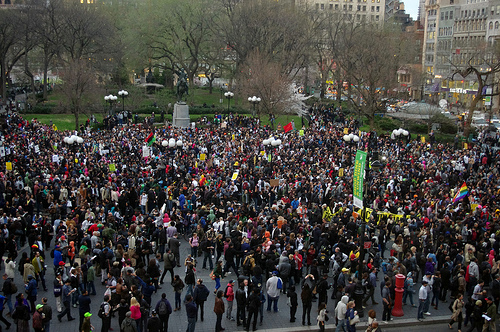Why Networks for Social Change?
July 31, 2013 6 Comments“Thinking in terms of networks can enable us see with new eyes.”
– Harold Jarche

Photo by David Shankbone
The biological sciences have revealed that all living things in an ecosystem are interconnected through networks of relationship; that is, they literally depend upon a web of life to survive and to thrive. On the social science front, we are also beginning to appreciate that groups, organizations, and communities depend upon and function in distributed networks of relationship that go beyond contrived boundaries, formal roles, communications, or decision-making protocols. After all, we are a part of life!
This perspective is significant, as it moves us beyond what we as a society have long held as a predominantly mechanical, linear, and individualistic view of the world and ourselves. Embracing a network view of things invites us to consider not just individual elements but relationships between elements; embrace not just linear planning but emergence (new and unexpected phenomena emerging from interaction); and to wrestle with the complexity underlying social change and personal development.
In the face of complex social and ecological issues, such as systemic oppression, climate change, and poverty, single actors are hard pressed to have significant impact, much less hold the full picture of current circumstances or underlying causes. This is why at IISC, we agree with futurist Andrew Zolli when he says that the unit of action in the 21st century is the network not the organization. Simply put, multi-organizational and multi-individual networks are able to achieve more (understanding, resilience, action) than any entity could alone.
Working through networks calls on a specific set of skills and sensibilities that may or may not be present in organizations and communities. This includes leading with building relationships and trust across boundaries (geographic, cultural, disciplines), understanding existing patterns of connection and what these facilitate in terms of outcomes and possibilities, creating space for open conversation and emergent thinking, valuing actual contributions over formal credentials, and embracing diversity and divergence.
Our practice around “network building” has been informed by the work of Madeleine Taylor and Peter Plastrik (2006) on social change network typologies, which suggests that in order to build a diverse, distributed, and resilient network capable of tackling complex change, we must attend to: (1) creating greater connectivity (trust building, information sharing, learning), (2) alignment (around a shared identity and/or value proposition), and (3) collective action (advocacy, education, leveraging new markets and resources, launching new initiatives, etc.). The basic idea, and evidence from our experience at IISC, is that as people feel more connected and aligned, the thought of collective action becomes that much more inviting and its potential impact that much greater and longer lasting.
Furthermore, we recognize that the social change work we and our partners are undertaking is a marathon, not a sprint, and the nature of the challenge we are engaged with is not only technical in nature, but adaptive. As such, this is not simply about creating campaigns to change policy, but it’s about creating “movement networks” (Robin Katcher, 2010) that are built for the long-term on trusting relationships and with a degree of distributed-ness and porousness that continuously invites new energy, contributions, and exchanges.
In addition, we are inspired by the work and writings of numerous other theorists and practitioners (Marina Gorbis, Geoffrey West, Jane Wei-Skillern, Fritjof Capra, john a. powell, June Holley, Harold Jarche, Seth Godin, among others) that together suggest the turn to networks is about a fundamental cultural shift in the way we live and relate to one another in community and do business. Underlying all of this work is the idea that we are moving away from an extractive paradigm that has realized certain kinds of value for ever fewer people to a regenerative approach that recognizes and creates new kinds of value that lead to thriving for all.
6 Comments
Wonderful. This puts emergence and chaos/complexity concepts in everyday language (well relatively so, anyway). Thanks
Howy I am so delighted I found your site, I really found you
by accident, while I was searfhing on Digg for something
else, Regardless I am here now and would just like to ssay thanks for a remarkable post and a
all round interesting blog (I also lovge the theme/design), I don’t have time to read
through it all at the minute but I have saved it and also included your RSS feeds, so when I havge time I will bee back to read more,
Please do keep up tthe awesome job.
Thanks for sharing such a nice information. I’m sure that it will be beneficial for many of us.